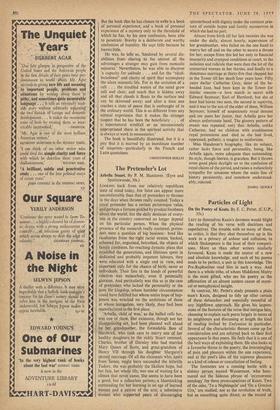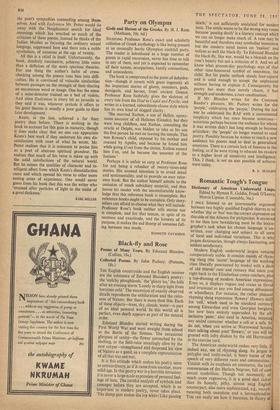Particles of Light
LEFT to themselves Keats's devotees would blight the reading of his verse with doctrines and
superlatives. The trouble with so many of them, as critics, is that they shut themselves up in his work in a privacy of ardour and collusion, in which Shakespeare is the least of their compari- sons. More so than other writers similarly favoured, Keats is made the source of a new - and absolute knowledge, and each of his poems tends to be perfect, a unit in this knowledge. The Pre-Raphaelites read him in such a way. And there is a whole tribe, of whom Middleton Murry is the most gifted, who see his poetry as the affirmation of an almost austere canon of mysti- cal or metaphysical insight.
In contrast, Mr. Pettet's study presents a plain man's Keats, designed to tidy up after certain of these debauches and especially resentful of any highflown approach. He gives his impres- sions of the features of the verse that intrigue him, choosing to explain each poem largely in terms of
its neighbours and discussing at length the kind of reading invited by Endytnion in particular.
Several of the characteristic themes come up for consideration and are referred back to their first appearance in that poem. He feels that it is one of
the bet ways of explaining them. He also looks at a favourite theme in the poetry, the intermingling of pain and pleasure within the one experience, and at the poet's idea of the supreme pleasures as a kind of release or cancellation of feeling.
The footnotes are a running battle with a sinister person . named Wasserman, who ham- mered out the hideous phrase of 'oxymoronic ontology' for these preoccupations of Keats. Two of the odes, 'To a Nightingale' and 'On a Grecian Urn,' are studied, not as the revelation of truth, 1 but as something quite direct, as the record of the poet's sympathies contending among them- selves. And with Endymion Mr. Pettet would do away with the Neoplatonist search for ideal meanings which has wrecked so much of the criticism of these poems. Instead he thinks of the Indian Maiden as focusing the ordinary sexual longings, suppressed here and there into a noble symbolism, of someone at the age of twenty.
All this is a relief in itself. Unfortunately, the book, slenderly ruminative, achieves little more than a deflation of the more specious theories. For one thing the author's habit of cross- checking among the poems runs him into diffi- culties. He is convinced of valuable similarities between passages on the strength of their sharing an uncommon word or image. One has the sense of a mine-detector trained on a bed of violets. And since Endymion is every bit as juvenile as they said it was, whatever prelude it offers to his great themes is usually a poor guide to their later development.
Keats, at the last, achieved a far finer poetry than before. There is nothing in the book to account for this gain in maturity, though it does make clear that no one can appreciate Keats's best work if they underrate his own dis- satisfaction with most of what he wrote. Mr. Pettet realises that it is nonsense to praise him as a poet of abstruse spiritual grandeur. He realises that much of his verse is taken up with the solid satisfactions of the natural world. But he misses the qualities of character and in- telligent effort from which Keats's dissatisfaction came and which opened his verse to other more testing areas of experience. One would never guess from his book that this was the writer who 'strained after particles of light in the midst of a great darkness.'
KARL MILLER



































 Previous page
Previous page